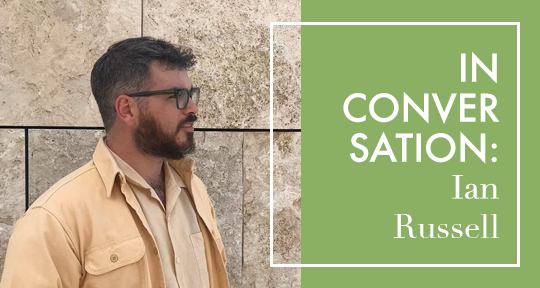In my reading of the current Winter 2022 issue, I was drawn to the vivid and imaginative poetry of Spanish artist Pepe Espaliú. The featured excerpt, translated beautifully by Ian Russell, was taken from Espaliú’s only collection of poetry, En estos cinco años (Through These Five Years). The collection was written in the years preceding his death from AIDS, gracefully exploring the topic of mortality. Russell’s translations introduce a new audience of Anglophone readers to a dynamic activist, who fought to call attention to AIDS through his art while many political leaders refused to even acknowledge the disease. Russell was generous enough to agree to speak with me over email, and in the following interview we discuss Espaliú’s legacy as a performance artist, the communal aspect of translation, and some interesting parallels between birding and poetry.
Rose Bialer (RB): Before we start discussing your translations of Espaliú’s work, I’m curious to know how you became interested in translation in the first place. What was your introduction to the craft?
Ian Russell (IR): I can think of two starts. I got offered some freelance work to translate articles from Spanish to English while I was in grad school and took them purely to make a little extra money. I actually felt like I wasn’t very good at it. But right around that same time I had some friends that wrote poetry ask me to help translate their work. I felt totally unqualified since I had only done these academic articles, but after working on them and talking through the poems it became a really gratifying creative outlet for me.
RB: How did you come across Pepe Espaliú’s art? What initially attracted you to his poetry?
IR: I came across Espaliú’s visual work in researching HIV/AIDS in Spain. Later, I discovered he had written quite prolifically, and I found a copy of the first printing of En estos cinco años in the library (this was before Jesús Alcaide’s stunning 2018 La imposible verdad); I really loved the sort of smallness, the roundness, that I encountered in that short edition. I don’t know if that makes sense—the book is comprised of several different sections that seem pretty hermetic at first read, and many poems have an aphoristic quality. Other prose poems sit in their text blocks on the page. I felt a smallness and roundness that was easily digestible, maybe.
RB: In your translator’s note you mention that a challenge you faced in rendering this excerpt of Espaliú’s poetry was understanding that his poems are only a part of his artistic repertoire—he was also a visual and performing artist. How did you go about translating this poetry with consideration of Espaliú’s larger body of work? Did you translate while immersing yourself in it?
IR: I actually started writing about Espaliú’s performance work first. During the pandemic, I found it more difficult to keep up with that sort of critical analysis, and turned to translating Espaliú as a way to think about his performances, as if translating might offer some clue to approach the visual/performance. I think the main piece that came together for me in that process was how the installation, performance, and poetic pieces all read as a reaching out, a convocation of togetherness. So, in that way, I became more comfortable translating the work as a gesture of togetherness with the artist.

